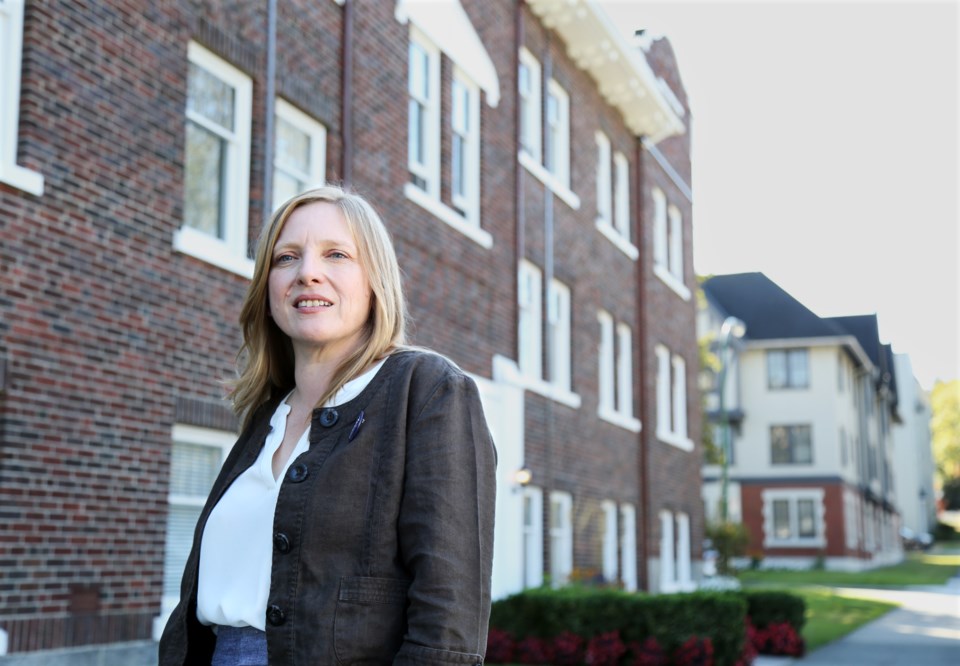The party that dominated Vancouver politics for a decade wants to open all neighbourhoods to townhouses, row houses and mid-rise apartment buildings and scrap public hearings for below-market housing projects.
Vision Vancouver, which was in power at city hall from 2008 to 2018, released its housing platform Sept. 18 and is hoping its plan will attract the attention of voters in the Oct. 15 civic election.
“People shouldn't be worried that we're talking about overnight transformation of neighbourhoods,” said Vision council candidate Lesli Boldt, a longtime communications professional. “But we're definitely talking about more housing in neighbourhoods throughout the city.”
Vision’s call for more housing types across the city has been one pushed by some members of the current council. It’s also a big plank in OneCity’s campaign, with the party and its incumbent councillor Christine Boyle wanting an end to the “apartment ban,” arguing that it locks renters and workers out of exclusive neighbourhoods.
What Vision wants is a vote within 90 days of the new council session on citywide zoning reform and to see single-family neighbourhoods transform into areas like 15th Avenue and Granville Street, where older, mid-rise apartment buildings are plentiful.
“I feel like there's a broad consensus not just at the political level, but with the public to allow more of this kind of housing,” said Boldt, a longtime renter. “Some people are concerned about towers. The reality is, if you allow more types of housing in more parts of the city, there's less pressure for towers.”
Scrapping public hearings
Boldt said both the Broadway and Vancouver plans, which were passed by the current council, would inform Vision’s proposed policy, which in some cases has already been rolled out, with a move last year to allow six-storey rental buildings along many of the city’s arterial routes.
Council also moved last fall to permit four-storey rental apartments on side streets in single-family neighbourhoods — and scrap the rezoning and corresponding public hearing process for six-storey rental projects in select commercial zones or shopping areas from Hastings-Sunrise to Dunbar.
The motivation behind that move was to entice developers already allowed to build four-storey condo buildings along commercial arterials — without going to a public hearing — to consider adding two storeys to a project and build a rental complex with commercial tenants on the ground floor.
Those amendments to the zoning and development bylaw came into effect in January.
Scrapping public hearings for below-market housing projects is among the most controversial planks in Vision’s housing plan, with Mayor Kennedy Stewart — who is seeking re-election with Forward Together — calling it “slightly inflammatory.”
“I do think that the public needs to stay involved in how their city changes,” Stewart said Tuesday during a campaign stop in the Downtown Eastside.
At the same time, Stewart added, he favours “pre-zoning” of parts of the city, where an initial public hearing is held on policy changes, which would then not require subsequent public hearings, for example, on rental, social or other buildings of significant public interest.
“We definitely think this is where we need to go, and we need to do it as soon as we possibly can,” said Boldt, when asked about scrapping hearings. “We have a provincial government that is supportive of this approach, as well. So I think we'd have some success if we proceeded with that.”
Vision not running mayoral candidate
But to proceed with any of Vision’s housing plan, which also calls for more affordable housing on city-owned land, expanding protection and advocacy for renters, hiring a renters’ advocate and reducing building permit delays, the party has a big political hill to climb.
Boldt is only running with two candidates — Stuart Mackinnon and Honieh Barzegari — for three seats on an 11-member council, where Vision is currently not represented after being shut out in the 2018 election. The party is not running a mayoral candidate.
“There are a number of parties that are making similar commitments around housing, and we as Vision Vancouver councillors would work with the other councillors who share our values, share our commitment to getting things done,” she said.
Parties in this election cycle, particularly TEAM for a Livable Vancouver, have pointed to Vision’s 10-year reign at city hall as part of the reason the city is now unaffordable to many, with more high-priced condos built than affordable homes.
“We have an experienced, knowledgeable group of people running for city council this time, who are committed to acting on the priorities that we've released in our platform,” Boldt said in response to TEAM’s criticism. “We want action on housing — and again, we're willing to work with anyone who shares that commitment to get this done.”
Forward Together, OneCity and Progress Vancouver have released their housing platforms. The NPA, the Greens, COPE and ABC Vancouver are expected to release their plans soon.
@Howellings





